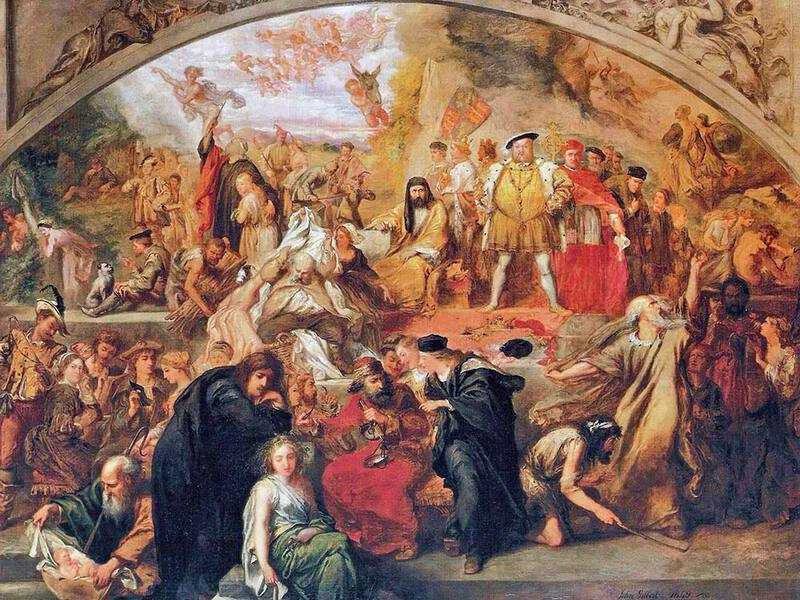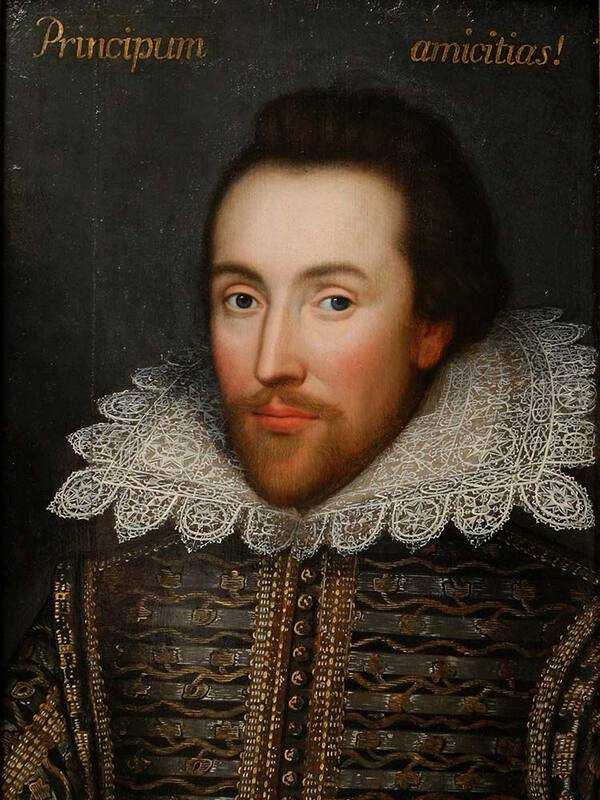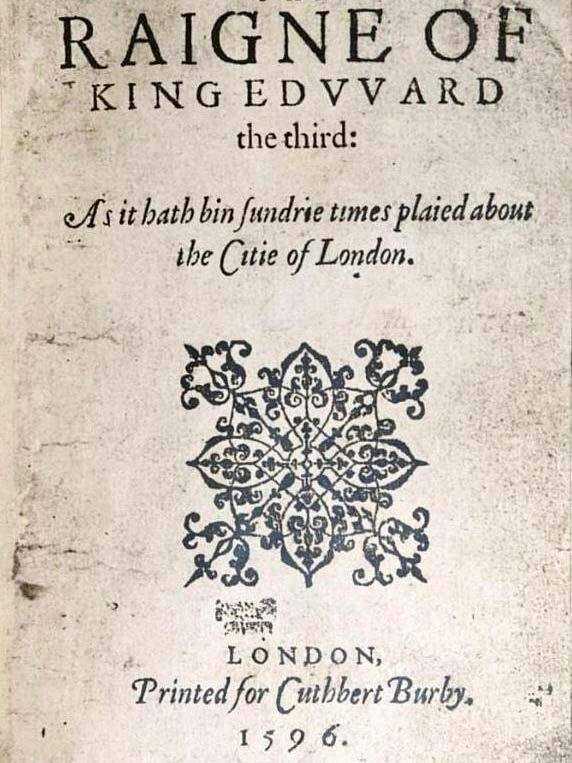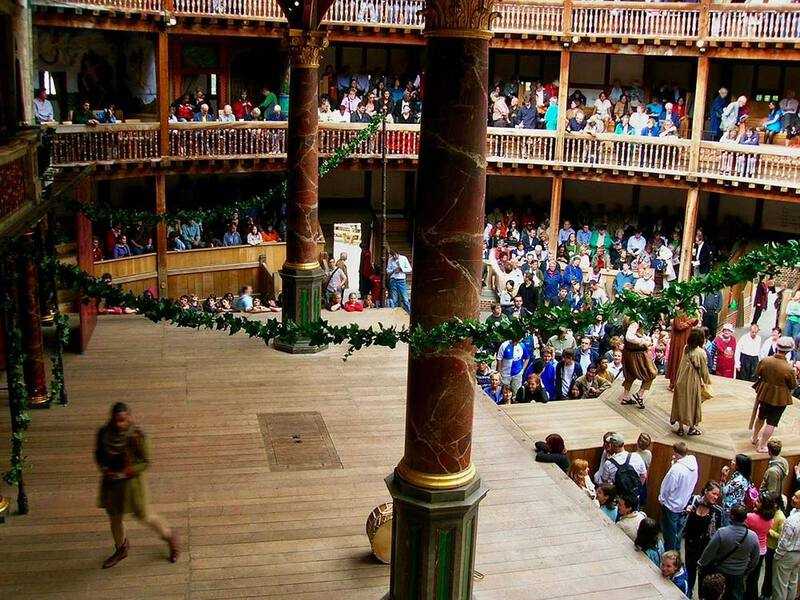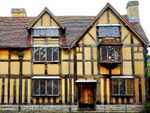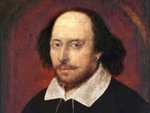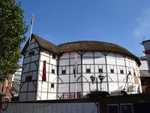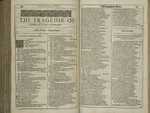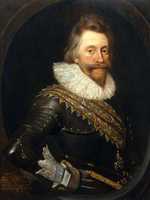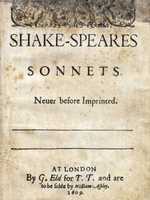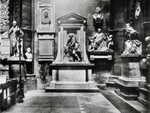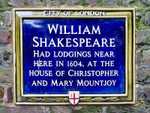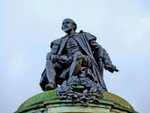1. Shakespeare's Life
Born in Stratford-upon-Avon in 1564 to parents John and Mary (an alderman and farmer’s daughter respectively), Shakespeare’s early years remain somewhat of a mystery to modern scholars.
What is known is that Shakespeare married Anne Hathaway at the age of 18. Hathaway, eight years Shakespeare’s senior, was pregnant at the time with the first of his three children.
Shakespeare moved to London in the early 1580s and embarked upon his career, becoming an actor and writer for, and the part-owner of, the Lord Chamberlain’s Men (one of the nation’s two leading playing companies, which became the King’s Men after James I awarded it a royal patent in 1603).
Shakespeare had probably become well known by 1592, following the success of his first play, Henry VI Part One (causing one critic to describe him as an “upstart young crow”). Most of Shakespeare’s surviving works date from between 1589 and 1613, when Shakespeare retired to Stratford-upon-Avon.
The Chandos portrait, now displayed in Central London’s National Portrait Gallery, is one of the few surviving paintings of Shakespeare. Like Shakespeare’s image, details of his personal life are few and far between: his name appears in a few court records and it is known that he had become wealthy by 1597, buying the second largest house in Stratford.
But speculation as to his sexuality (fuelled by the content of his sonnets) and religious belief abounds.
Shakespeare died in Stratford-upon-Avon on 23 April 1616, aged 52.
2. Shakespeare's Plays
Shakespeare produced about 38 plays in total.
Comedies, histories, tragedies and romances ...
Shakespeare's early works, mainly comedies and histories such as A Midsummer Night’s Dream, Merchant of Venice, Much Ado About Nothing, Twelfth Night and As You Like It, date from about 1589 to 1600.
The next phase in Shakespeare’s career was largely devoted to tragedies such as King Lear, Othello, Antony and Cleopatra and Macbeth, written between 1600 and 1608.
The final chapter focused on romances, and saw the writing of Cymbeline, The Winter’s Tale and The Tempest.
Shakespeare's last play, The Two Noble Kinsmen (co-written with John Fletcher), was produced in 1613--three years before his death--and is little known.
The Globe Theatre
Many of Shakespeare’s plays were written to be performed at the Globe Theatre, a playhouse designed by actors on the south bank of the Thames, which saw the first performances of Hamlet, Othello and King Lear.
A faithful reconstruction of that theatre, which burnt to the ground in 1613, was erected close to the site of the original in 1997.
What are Shakespeare's most famous plays?
Surveys have shown that Shakespeare's most famous plays are Romeo and Juliet, Hamlet and Macbeth.
Some of the key quotes from these plays are as follows
"Life's but a walking shadow, a poor player, That struts and frets his hour upon the stage, And then is heard no more. It is a tale Told by an idiot, full of sound and fury, Signifying nothing" (Macbeth)
"To be, or not to be: that is the question: Whether 'tis nobler in the mind to suffer The slings and arrows of outrageous fortune, Or to take arms against a sea of troubles, And by opposing end them? To die: to sleep; No more; and by a sleep to say we end The heart-ache and the thousand natural shocks That flesh is heir to, 'tis a consummation Devoutly to be wish'd. To die, to sleep; To sleep: perchance to dream: ay, there's the rub; For in that sleep of death what dreams may come When we have shuffled off this mortal coil, Must give us pause: there's the respect That makes calamity of so long life..." (Hamlet)
"O Romeo, Romeo, wherefore art thou Romeo?" "That which we call a rose By any other word would smell as sweet." "A plague o' both your houses!" and "For never was a story of more woe Than this of Juliet and her Romeo." (Romeo and Juliet)
3. Shakespeare's Sonnets
Shakespeare was a prolific writer of sonnets, 14-line poems in iambic pentameter divided into three four-line stanzas and a final couplet.
He produced at least 154 of them in addition to those found in his plays. Published in 1609 by Thomas Thorpe, the sonnets address issues such as love, beauty, mortality and time.
The sonnets were written over at least the previous decade, and were not produced in the order in which they now traditionally appear.
The Fair Youth
The first 126 sonnets are addressed to an unnamed Fair Youth, who scholars have sought without success to definitively identify. One contender is Henry Wriothesley, the 3rd Earl of Southampton, and Shakespeare’s patron.
The terms of some of the sonnets—and in particular Sonnet 18, and the line “Shall I compare thee to a summer’s day”—have led to speculation that Shakespeare was bisexual.
The Fair Youth sonnets have accordingly been controversial. One notorious edition, published by Benson in 1640, even changed the pronouns (replacing the words 'he', 'his' and 'him' for 'she', 'hers' and 'her')!
The Dark Lady
The next 25 sonnets are directed to the Dark Lady and are characterised by their overtly sexual nature.
Academics disagree as to who the dark lady was, and even if Shakespeare was referring to a brunette, a lady from the Mediterranean or a lady of African descent. Shakespeare's relationship with the Dark Lady is difficult to understand: in some of the sonnets, he praises her; in others, he mocks.
The final two sonnets are allegorical treatments of Greek statements, with the collection finishing with the poem “A Lover’s Complaint”.
Sonnet 18
Most people know the first line to Sonnet 18. But how much further can you get? Most people can't get past the first stanza ....
[1] Shall I compare thee to a summer's day?
[2] Thou art more lovely and more temperate:
[3] Rough winds do shake the darling buds of May,
[4] And summer's lease hath all too short a date:[5] Sometime too hot the eye of heaven shines,
[6] And often is his gold complexion dimm'd;
[7] And every fair from fair sometime declines,
[8] By chance, or nature's changing course, untrimm'd;[9] But thy eternal summer shall not fade
[10] Nor lose possession of that fair thou ow'st;
[11] Nor shall Death brag thou wander'st in his shade,
[12] When in eternal lines to time thou grow'st;[13] So long as men can breathe or eyes can see,
[14] So long lives this, and this gives life to thee.
4. Shakespeare's Legacy
Shakespeare’s impact can be measured in a number of ways.
During his lifetime he shied away from the traditional style of incorporating grand speeches into his works. Rather, Shakespeare used soliloquies to explore the minds of his characters. Shakespeare was also the first to consider romance as a worthy topic for tragedy.
And then there are the memorable phrases coined by Shakespeare, including ‘with bated breath’, a ‘foregone conclusion’, ‘mortal coil’, ‘love is blind’, ‘pound of flesh’, ‘method in madness’, ‘salad days’, ‘slept a wink’, ‘game is up’, ‘Greek to me’ and ‘into thin air’.
Another way of assessing Shakespeare’s contribution is by measuring the impact he had on those who followed him: Shakespeare influenced writers such as Hardy, Dickens and Melville; inspired over 20,000 pieces of music, including operas by Verdi, and painters from the Romantic and Pre-Raphaelite movements; and even Sigmund Freud incorporated Hamlet into his theory of human behaviour.
A third assessment is the popularity of Shakespeare’s works to this day. His plays have been translated into every major language (including Esperanto) and are performed more than those of any other playwright. This is reflected in the number of lines from Shakespeare’s works in common knowledge or usage.
Here are just a handful of examples:
“To be or not to be”,
“All the world’s a stage”,
“The course of true love never did run smooth”,
“a rose by any other name would smell as sweet”,
“Double, double, toil and trouble”,
“My Kingdom for a horse”,
“all that glistens is not gold”,
“what’s done cannot be undone”,
“the lady doth protest too much”,
“too much of a good thing”,
“first, kill all the lawyers”,
“to thine own self be true” and
“all’s well that ends well”.
